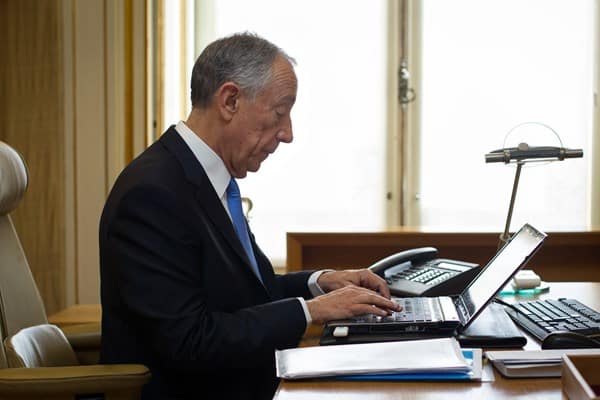Portugal’s head of state stresses “there is no reason for the (political) crisis”
As the reverberations of Saturday night’s ‘address to the nation’ by the prime minister continue, another unfortunate detail has popped into the mix: according to SIC’s political commentator Bernão Ferrão, President Marcelo did not answer the PM’s phone call when it finally came on Saturday.
President Marcelo had apparently made it perfectly clear that he was available to help with the wording of whatever the prime minister was thinking of saying. But throughout Saturday afternoon, he heard nothing.
Then came the speech – which has served frankly to make matters even worse than they were before – and finally, the PM made his phone call to Belém, which Marcelo did not answer.
As Ferrão explains, the president feels the prime minister should have listened to his opinion on the declaration to be made to the country. Marcelo concedes that the head of government has every right not to call the president in such situations – but reminds that it could have been in the prime minister’s interest to hear the head of state’s opinion.
Showing a real ‘chink’ in the relationship between the two men, Ferrão says “the president also recalls this is Montenegro’s usual behaviour – leaving everything to the last second and being very personal in the decisions he makes, i.e. not listening to Belém”. I.e. not listening to someone who has been overseeing the country’s affairs and performance for the best part of a decade, and most of it with a government of a political colour that differed from his own. Now that the country is being led by social democrats (a party Marcelo has been aligned with throughout his political career), it is clear the president believed there would be more of a working rapport.
As to the gathering hysteria and threats of motions of censure flying this way and that, Marcelo has said he really does not know what the government was thinking about when it mentioned a possible motion of confidence (the likelihood of which has disappeared almost as fast as it was trailed).
In Marcelo’s opinion, the country has good economic results, and parliament is functioning. The notion of throwing everything to the wind at such a sensitive time on a European level is clearly exasperating him.
“The president intends to remain silent until the motion of censure tabled by the PCP is debated”, says Ferrão.
The motion was tabled today, entitled “Halting the deterioration of the national situation, for an alternative policy of progress and development”.
The text refers to “the succession of facts that are accumulating involving members of the government and the prime minister himself – with no new facts to dispel or remedy facts that remain unclear” not being the “work of chance (…) They translate and express a mixture between the exercise of public functions and private interests, and to the promiscuity between political and economic power,” says the party.
For the PCP, “beyond the seriousness of the deplorable facts and events, it is important not to forget the essential issue: that of the government’s policy which, instead of solving the country’s problems, is itself the main and primary problem”.
“The government’s policy and practice show that it neither intends to nor is in a position to respond to the country’s problems, and that in itself is a factor in discrediting political life (…) the political options pursued, and the government that realises them, deserve and require clear censure”.
According to the Rules of Procedure of Parliament, the debate on a motion of censure “begins on the third parliamentary day following the presentation of the motion of censure”, so it should take place on Thursday or Friday.
Source: LUSA/ SIC




















